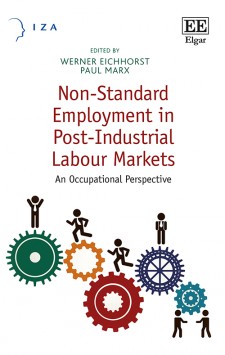Müller, Torsten, (2016), “The king is dead – long live the king: what follows after the Troika?”, Working Paper 2015.09, European Trade Union Institute, Φεβρουάριος. The focus of this paper is the need to reshape the financial assistance programmes and the related activities of the Troika in a way that would make them more socially and democratically acceptable. The starting point, therefore, is an analysis of the current role of the Troika and …Read More
Non-Standard Employment in Post-Industrial Labour Markets-An Occupational Perspective
Eichhorst, Werner, Marx, Paul, (2015), “Non-Standard Employment in Post-Industrial Labour Markets-An Occupational Perspective”, IZA, Edward Elgar Publishing. Examining the occupational variation within non-standard employment, this book combines case studies and comparative writing to illustrate how and why alternative occupational employment patterns are formed. Non-standard employment has grown significantly in most developed economies, varying between countries. Different institutional settings have been deemed accountable for this variation, although inadequate consideration has been given to differences within national …Read More
Lending-of-last-resort is as lending-of-last-resort does: Central bank liquidity provision and interbank market functioning in the euro area
Garcia-de-Andoain, Carlos, Heider, Florian, Hoerova, Marie, Manganelli, Simone, (2016), “Lending-of-last-resort is as lending-of-last-resort does: Central bank liquidity provision and interbank market functioning in the euro area“, European Central Bank Working Paper, No 1886, Φεβρουάριος. This paper investigates the impact of ample liquidity provision by the European Central Bank on the functioning of the overnight unsecured interbank market from 2008 to 2014. We use novel data on interbank transactions derived from TARGET2, the main euro area payment …Read More
Which fiscal union for the euro area?
Bénassy-Quéré, Agnès, Ragot, Xavier, Wolff, Guntram B., (2016), “Which fiscal union for the euro area?“, Bruegel Publications, Issue 2016/05, 18 Φεβρουαρίου. At the current level of political and societal integration, a large federal budget is unrealistic in the euro area. The authors make three recommendations that would lead national fiscal policies to be more stabilising with respect to the economic cycle, while achieving long-term sustainability. They also recommend a move towards a European unemployment insurance scheme …Read More
Introducing Kuznets waves: How income inequality waxes and wanes over the very long run
Milanovic, Branko, (2016), “Introducing Kuznets waves: How income inequality waxes and wanes over the very long run“, Voxeu, 24 Φεβρουαρίου. The Kuznets curve was widely used to describe the relationship between growth and inequality over the second half of the 20th century, but it has fallen out of favour in recent decades. This column suggests that the current upswing in inequality can be viewed as a second Kuznets curve. It is driven, …Read More
The US sneezes and the Eurozone catches a cold: The Eurozone has been infected by the US slowdown
Caruso, Alberto, Hasenzagl, Thomas, Pellegrino, Filippo, Reichlin, Lucrezia, (2016), “The US sneezes and the Eurozone catches a cold: The Eurozone has been infected by the US slowdown”, Voxeu, 22 Φεβρουαρίου Recent data releases related to the Eurozone have been disappointing. This column argues that momentum from the long-delayed 2014-15 recovery is faltering because the Eurozone economy is affected, with a lag, by the US slowdown. The traditional, lagged relationship between the EZ and US business cycles – …Read More
Inequality: The Structural Aspects
Milanovic, Branko, (2016), “Inequality: The Structural Aspects”, Social Europe Journal, 17 Φεβρουαρίου Despite the unprecedented attention that income and wealth inequality has received in this year’s presidential campaign in the United States and in several recent elections in Europe, one cannot but have the impression that, for many centrist politicians, inequality is just a passing fad. Σχετικές Αναρτήσεις F. Campos, Nauro, B Nugent, Jeffrey, (2016), “Labour market reforms, growth and inequality: Evidence from …Read More
How the Euro Crisis was successfully resolved
Eichengreen, Barry, Wyplosz, Charles, (2016), “How the Euro Crisis was successfully resolved”, Voxeu, 12 Φεβρουαρίου When the newly elected Greek government of George Papandreou revealed that its predecessor had doctored the books, financial markets reacted violently. This column discusses the steps implemented by policymakers following this episode, which were essential in resolving the Crisis. What is remarkable, in hindsight, is the combination of pragmatism and reasoning based on sound economic principles displayed by …Read More
Is fiscal consolidation self-defeating? A Panel-VAR analysis for the Euro area countries
Attinasi Grazia, Maria, Metelli, Luca, (2016), “Is fiscal consolidation self-defeating? A Panel-VAR analysis for the Euro area countries”, European Central Bank Working Paper, No. 1883, Φεβρουάριος This paper studies the effects of fiscal consolidation on the debt-to-GDP ratio of 11 Euro area countries. Using a quarterly fiscal Panel VAR allows us to trace out the dynamics of the debt-to-GDP ratio following a fiscal shock and to disentangle the main channels …Read More
What’s Holding Back the World Economy?
Stiglitz, Joseph, Rashid, Hamid, (2016), “What’s Holding Back the World Economy?”, Project Syndicate, 8 Φεβρουαρίου Seven years after the global financial crisis erupted in 2008, the world economy continued to stumble in 2015. According to the United Nations’ report World Economic Situation and Prospects 2016, the average growth rate in developed economies has declined by more than 54% since the crisis. An estimated 44 million people are unemployed in developed …Read More





